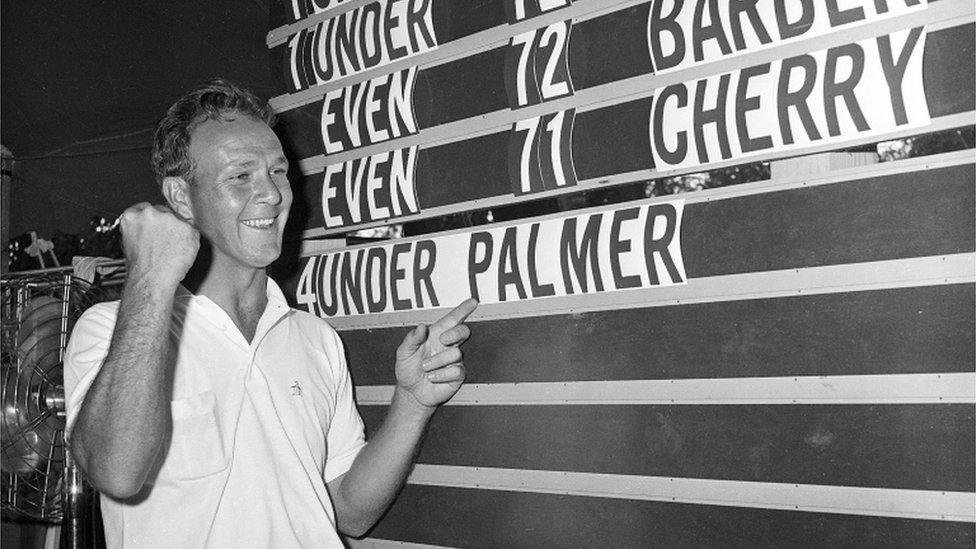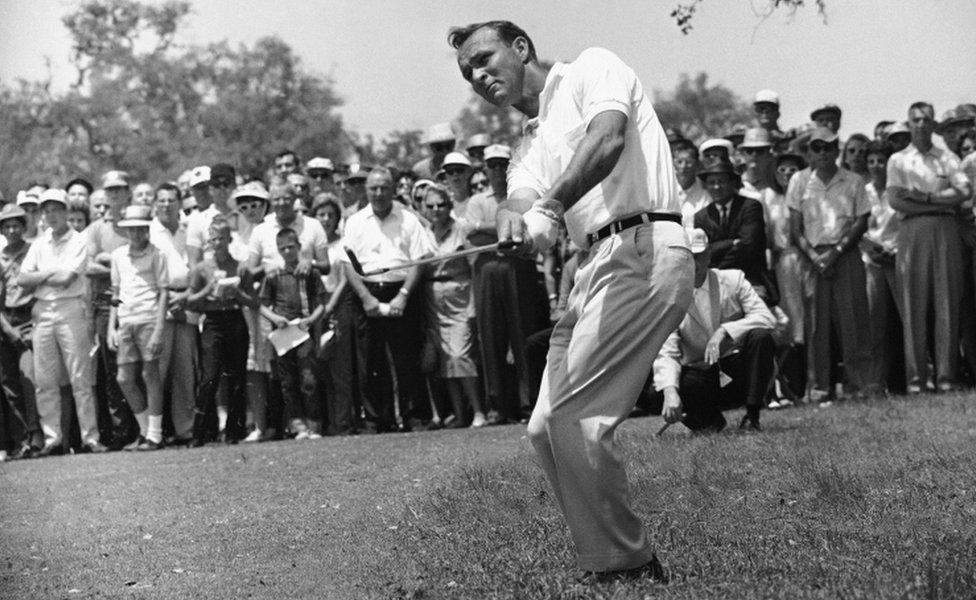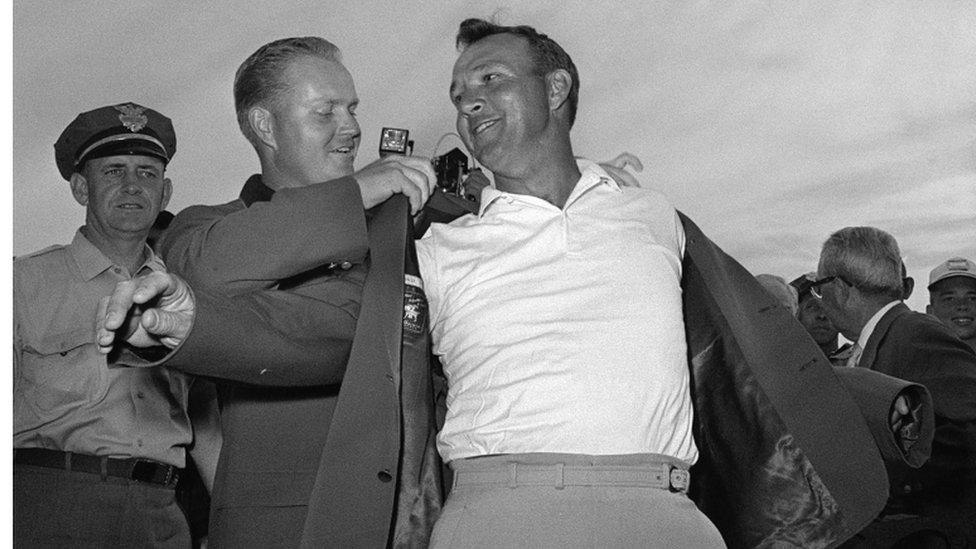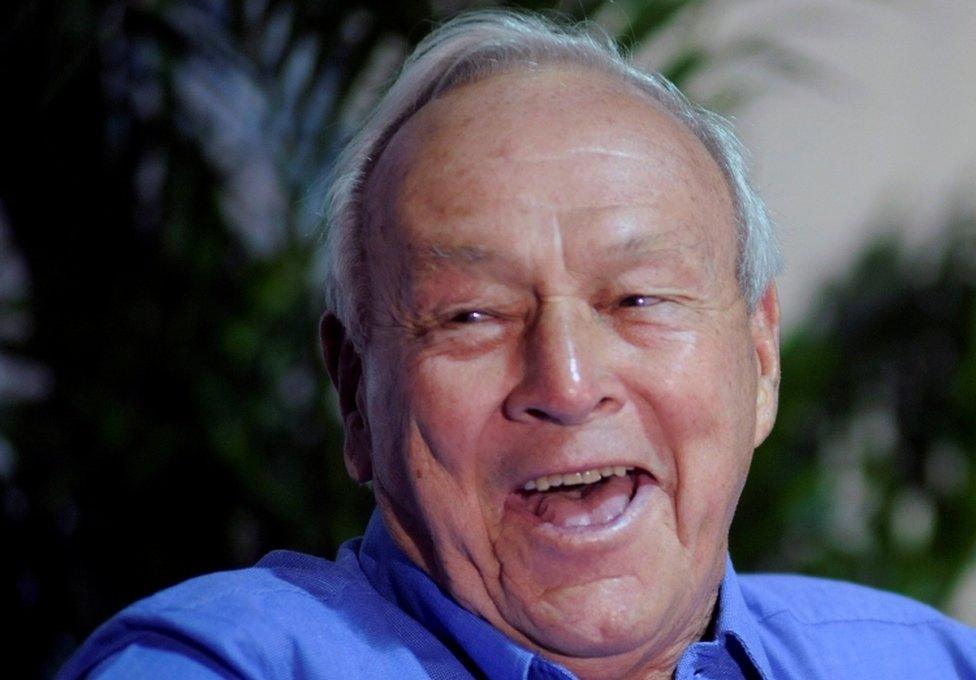Obituary: Arnold Palmer
- Published

At the start of the 1960s, Palmer became the preeminent player of the game
Arnold Palmer was a golfing legend, who, more than any other, was largely responsible for the explosion of interest in the game in the 1960s.
He won 91 professional titles, including the Open twice, the US Open, and the Masters four times.
The US PGA eluded him, although he was runner-up three times.
But it was Palmer's aggressive technique, cavalier style, good looks and charisma that made him such a popular figure.
It has been said that people would rather see Arnold Palmer score an 80 than other golfers in the low 60s.
His fans followed him in raucous hordes and became known as Arnie's Army.
Although he hit the ball very hard, he had an easy, friendly disposition.
He greatly helped in the revival of the Open in Britain, in which he first played in 1960. He lost by one stroke, but took the title the following two years.
Arnold Palmer was a classic example of the American dream, an ordinary country boy who became world-famous, but who never lost the common touch.

Arnold Palmer at the Texas Open in San Antonio in April 1962
From caddie to champion
He was the son of the golf professional at Latrobe, a small industrial town in Pennsylvania, where he was born in 1929. He first began swinging cut-down golf clubs when he was four years old.
Before long, he was beating the older caddies at the club. He became a caddie himself at the age of 11 and worked at virtually every job at the club in the following years.
He recalled that he gained his powerful arm strength from pushing a mower to help his father tend the course.
"In those days, there were no motors on anything except the tractor. The mowers to cut greens with, you pushed," he said.
He was US amateur champion by 1954, before turning professional. It was his double success in the Masters and the US Open in 1960 that really made his reputation.

Jack Nicklaus helps Arnold Palmer put on the green jacket after he won the Masters at Augusta in April 1964
In the Masters he had birdies at the last three holes to win.
In the US Open he was lying seventh, seven strokes behind the leader after three rounds, but won by two strokes, scoring six birdies in seven holes in the final round.
This coming from behind became known as a Palmer Charge.
In the 1961 Open at Royal Birkdale he played out of a bush so hard that it was uprooted, but the ball finished on the green, and he went on to win.
He could also lose in spectacular fashion. In the 1961 Masters he played into a bunker on the last hole when he seemed almost certain to win, and Gary Player took the title.
He represented the US in the Ryder Cup six times, twice as captain.
He won his last major title in 1964, and Jack Nicklaus took over his mantle.

Palmer set high standards of sportsmanship
Business and charity
It was during his heyday that his business interests began to sprout, given impetus by his business manager, Mark McCormack, whose own business empire began with Palmer.
Arnold Palmer Enterprises became a multi-divisional empire involving merchandise, automobiles and aviation.
Another important commercial arm was his course design and management.
He also was heavily involved in charity work. He played a major role in the fund-raising effort that led to the establishment of the Arnold Palmer Hospital for Children and Women in Orlando in the 1980s.
Palmer continued to play in tournaments into his seventies, often teaming up with former rivals, Gary Player and Jack Nicklaus, in the first round of the Masters.
At Augusta, they laid a plaque behind the 16th tee to honour his four wins there.
It was once said of Arnold Palmer that he set standards of sportsmanship and behaviour that were to guide the conduct of his profession.
Beneath all the flash and dash, he had a deep appreciation of the game of golf and its niceties.